In Lunch Bucket Paradise, Fred Setterberg gives a vivid description of life in California from the 1950s-1960s. Setterberg’s style of writing quickly pulls the reader into his world. I’ve never been to California, my parents were born in the years when his story begins and I seemingly have nothing in common with Setterberg’s experiences, but that doesn’t matter at all. The people in his “true-life novel” are so vivid that almost instantly you understand how their minds work and their relationships to each other. Continue reading “Lunch Bucket Paradise”
NewPages Blog
At the NewPages Blog readers and writers can catch up with their favorite literary and alternative magazines, independent and university presses, creative writing programs, and writing and literary events. Find new books, new issue announcements, contest winners, and so much more!
Lunch Bucket Paradise
Spread the word!
selected unpublished blog posts of a mexican panda express employee
selected unpublished blog posts of a mexican panda express employee is a collection of unpublished blog entries that teeters between poetry and prose writing. Rarely do I come across writing that can pass as both styles, which is interesting. There are no capital letters in the entire book, which adds to the informal tone. Assuming the collection is autobiographical (as it stems from blog posts), Boyle is a 23-year-old bi-curious stoner who records her life. It is one of the most honest pieces I have ever read; she even lists every single person she has had sex with, never leaving out minor details such as whether or not they used condoms and if she had orgasms. After describing each of her 21 partners, Boyle enters a brief moment of self-reflection: “relieved I don’t have AIDS or children.” Continue reading “selected unpublished blog posts of a mexican panda express employee”
Spread the word!
New Lit on the Block :: The Adroit Journal
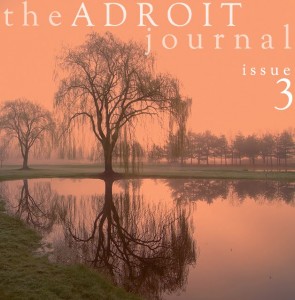 The Adroit Journal is a triannual downloadable PDF publication edited by Peter LaBerge (Editor-in-Chief), Ameerah Arjanee and Magen Eissenstat (Poetry Genre Editors), Connor Cook and Kratika Mishra (Fiction Genre Editors), Michele Ang (Art/Photography Editor), and additional staff members.
The Adroit Journal is a triannual downloadable PDF publication edited by Peter LaBerge (Editor-in-Chief), Ameerah Arjanee and Magen Eissenstat (Poetry Genre Editors), Connor Cook and Kratika Mishra (Fiction Genre Editors), Michele Ang (Art/Photography Editor), and additional staff members.
LaBerge tells me, “The Adroit Journal was conceived for mainly two reasons: as a fundraising vehicle for an organization called Free the Children Organization, and as an opportunity for teenagers to come together to produce a collection of quality literature.” A link to Free the Children is provided on The Adroit Journal website, and donors make their contributions directly to the organization.
Readers can expect to find a complete variety of poetry and fiction within the pages of The Adroit Journal. “Often readers and contributors remark that they cannot find a singular type of work that The Adroit Journal considers,” LaBerge notes, “because we consider (and publish) all different kinds.”
Some of the many contributors to date include: Poetry – Carol Guess, Dorianne Laux, Annie Finch, Lee Upton, Matt Mauch, Laura Kasischke, Darlene Pag
Spread the word!
New Lit on the Block :: HOOT
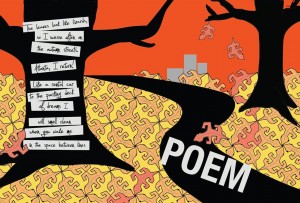 HOOT is a unique monthly traditional-mail delivered postcard print format with additional separate content online.
HOOT is a unique monthly traditional-mail delivered postcard print format with additional separate content online.
When asked Why start a literary magazine?, Editors Dorian Geisler and Amanda Vacharat replied: “This is a great question. It does seem counterintuitive, a little bit, to start a literary magazine now, in 2012 – when there are already a bazillion magazines struggling to find readers and subscribers. We started a literary magazine because we thought we saw an unfilled niche, based on what people are looking for right now. It’s not that people don’t want to read new authors anymore, it’s that they don’t want it to take up a lot of time. People want concision. Furthermore, they want things that are shareable and self-defining (think Twitter and Facebook posts). So, we made a magazine that’s short, and affordable, which (hopefully) looks good enough to be hung on a fridge, and is small enough that it can be easily passed along to others.”
I have personally received the HOOT postcards, and as a fan of postcard lit, can attest that these are some of the best quality cards in full color that I have seen.
HOOT editors claim that their publications contain “Zest! We like zest. So readers can expect to find it! By which we mean: surprises – not ‘twist’ endings, but a wide variety in styles and subject matter from issue to issue. HOOT readers can also expect to find art that is visually appealing and also varied in style.”
For the print (postcard) issue, there is only have one author per issue, so to date contributors include J. Bradley, John Steen, William Henderson, and Andrea Uptmor. Online issues, contributors to date are Meagan Wilson, Meghan Slater, Christopher Grosso, Stewart Lindh, William Doonan, Maria Anderson, Justis Mills, Caroline Zarlengo Sposto, Nick Sanford, Stephen Ross, Linda Simoni-Wastila, Thomas Mundt, and Marcy Campbell.
HOOT‘s plans for the future are “all about the idea that literature isn’t just for capital-L Literary types.” Editor Amanda Vacharat explains, “There’s quality work being written that has appeal for a much larger audience, as long as it fits into their schedules. So, we’re playing with the idea of printing literature on a variety of other mediums. We also want to make contemporary writing available to people who might not otherwise have access to it. We’re working towards a model where we can send some subscriptions into prisons and inner city schools and libraries. [Editor’s note: YEAH!] Also, starting in March, we’ll be running free, in-person writing workshops locally (Philadelphia).”
Submissions are year-round and rolling. For print, writers can submit by mail or online. There is a $2 fee for submitting online via Submishmash (which the editors encourage! because this is how they are able pay their authors). But, mail submissions are accepted too, with a SASE. All for-print submissions are automatically considered for online publication. Authors only interested in online publication can submit by email.
In addition to all of this, HOOT editors run free online workshops every Wednesday evening in a chat room – for flash fiction/non-fiction and short poems (<150 words). "Basically," Vacharat says, "we'll read your work right there and give you immediate feedback. You're also welcome to help give feedback on other people's writing. We're very supportive, while still being honest. We try to give very specific things to work on. It's great for all writers - but especially if you're thinking of submitting, you'll also get a great sense of what we tend to like (and not like)." [Pictured: HOOT: ISSUE 2, November 2011, “Poem” by John Steen]
Spread the word!
Celebrate National Poetry Month with FREE Poetry
 Free copies of the April 2012 issue of Poetry will be given to reading groups that request them by March 23. The Poetry Foundation asks that in return, you send a brief account of your discussion. Issues will be shipped in late March. Requests will be accepted online only here.
Free copies of the April 2012 issue of Poetry will be given to reading groups that request them by March 23. The Poetry Foundation asks that in return, you send a brief account of your discussion. Issues will be shipped in late March. Requests will be accepted online only here.
Spread the word!
AWP Women’s Caucus Meeting 2012
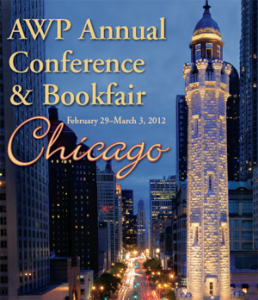 Where is the place for the woman writer within AWP and within the greater literary community? The women’s caucus discusses this as well as the continuing inequities in creative writing publication and literature. In addition, the panel will explore cultural obstacles in the form of active oppression, stereotypes, lack of access to literary power structures, historical marginalization of women’s writing, issues and perspectives, and the diverse voices of women. Networking opportunities.
Where is the place for the woman writer within AWP and within the greater literary community? The women’s caucus discusses this as well as the continuing inequities in creative writing publication and literature. In addition, the panel will explore cultural obstacles in the form of active oppression, stereotypes, lack of access to literary power structures, historical marginalization of women’s writing, issues and perspectives, and the diverse voices of women. Networking opportunities.
Event Participants: Lois Roma-Deeley, Patricia Smith, Rebecca Olson, Kathleen Aguero, Lisa Bowden
Scheduled Day: Friday, March 2
Scheduled Time: 10:30 AM to 11:45 AM
Scheduled Room, Hotel, Floor: Lake Erie, Hilton Chicago, 8th Floor
AWP Conference
Chicago, Illinois
February 29-March 3, 2012
Hilton Chicago & Palmer House Hilton
Spread the word!
Glimmer Train Short Story Award for New Writers Winners :: January 2012
Glimmer Train has just chosen the winning stories for their Short Story Award for New Writers. This competition is held quarterly and is open to all writers whose fiction has not appeared in a print publication with a circulation greater than 5000. The next Short Story Award competition will take place in February. Glimmer Train’s monthly submission calendar may be viewed here.
 First place: David Goguen of San Francisco, CA, [pictured] wins $1200 for “Old Teeth.” His story will be published in the Spring 2013 issue of Glimmer Train Stories, out in February 2013. This is David’s first story accepted for publication.
First place: David Goguen of San Francisco, CA, [pictured] wins $1200 for “Old Teeth.” His story will be published in the Spring 2013 issue of Glimmer Train Stories, out in February 2013. This is David’s first story accepted for publication.
Second place: Allison Frase Reavis, of Carrboro, NC, wins $500 for “Episodic Tremors.”
Third place: James Wheeler, of Baltimore, MD, wins $300 for “The International Typographers Union.”
A PDF of the Top 25 winners can be found here.
Deadline for the Very Short Fiction Award: January 31 Glimmer Train hosts this competition twice a year, and first place has been increased to $1500 plus publication in the journal. It’s open to all writers, no theme restrictions, and the word count must not exceed 3000.
Spread the word!
Authors Stand Up for Free Speech
Spread the word!
2011 Fall Black River Chapbook Competition Winner
 Black River Press has announced that Nick McRae has won the Fall 2011 Black River Chapbook Competition for his collection of poems, Mountain Redemption.
Black River Press has announced that Nick McRae has won the Fall 2011 Black River Chapbook Competition for his collection of poems, Mountain Redemption.
Nick McRae’s poems, reviews, and translations have appeared or are forthcoming in Hayden’s Ferry Review, Linebreak, Passages North, The Southern Review, Third Coast, and other journals. Formerly a Fulbright fellow in the Slovak Republic and a finalist for the Ruth Lilly Poetry Fellowship from the Poetry Foundation, he now studies poetry and teaches creative and analytical writing at The Ohio State University, where he also serves as Poetry Review Editor for The Journal.
Complete lists of the Fall 2011 Black River Chapbook Competition finalists and semi-finalists can be found on the Black Lawrence Press blog.
Spread the word!
Les Figues Press NOS Contest Winner
Judge Sarah Shun-lien Bynum has selected Among the Dead: Ah! and Afterward Yes! by Becca Jensen as the winner of the first annual Les Figues Press NOS Book Contest.
Among the Dead: Ah! and Afterward Yes! takes place inside a family of five: Mrs. G, Mr. G, the daughter, the collector, and the chorus. It is a book about reading, imagination and the possibility of finding solace — or at the very least, meaning — in beauty. Among the Dead: Ah! and Afterward Yes! will be published in Fall 2012.
2011 NOS Contest Finalists:
Alice Boiln
Louis Bury
Roxanne Carter
Tom Comitta
Dot Devota and Brandon Shimoda
Travis Hessman
Brenda Iijima
Michael Joyce
Karla Kelsey
Katie Price
Theresa Sotto
Spread the word!
Still Point Arts Gallery Exhibit Online
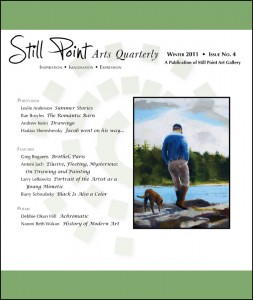 Still Point Art Gallery Current Exhibition THE ABSTRACTION ATTRACTION! opened on November 16 and will remain a featured exhibition through February 14. Abstract painting, photography, prints, and sculpture. Artists of Distinction for this show are Steven Bogart, Ling Ling Cheng, Nomi Drory, David Kinsey, Keith Parks, and Cat van der Heiden. These artists have also been awarded the opportunity to have their portfolios published in Still Point Arts Quarterly. The exhibit can be viewed in full on the Still Point Art Gallery website.
Still Point Art Gallery Current Exhibition THE ABSTRACTION ATTRACTION! opened on November 16 and will remain a featured exhibition through February 14. Abstract painting, photography, prints, and sculpture. Artists of Distinction for this show are Steven Bogart, Ling Ling Cheng, Nomi Drory, David Kinsey, Keith Parks, and Cat van der Heiden. These artists have also been awarded the opportunity to have their portfolios published in Still Point Arts Quarterly. The exhibit can be viewed in full on the Still Point Art Gallery website.
Spread the word!
Teacher Resource :: Collaborative Literature Study
The New York Times blog The Learning Network offers a post of resources to aid in collaborative literature study with readers who are face-to-face or located separately around the world: Reading With Strangers: Ways to Study Literature Collaboratively by Shannon Doyne and Holly Epstein Ojalvo.
Spread the word!
5×5 New Status and New Poetry Editor
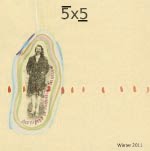
Congrats to 5×5 Magazine for their new nonprofit status: The 5×5 Nonprofit Organization of Literature & Arts Advocates. 5×5 keeps its self-titled size, accepting submissions from high school students and beyond, and providing subscriptions of its magazine at no cost for high school students. Mishon Wooldridge steps down as poetry editor with the Winter 2011 issue, but Jory Mickelson moves from Nonfiction Editor into the role. The new Nonfiction Editor has yet to be announced, but 5×5 assures its readers, “We’ve got that under control.”
Spread the word!
Event 2011 Creative Non-fiction Contest Winners
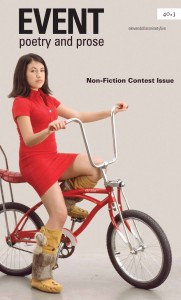 The newest issue of Event (40.3) features winning works of the magazine’s annual non-fiction contest judged by Kevin Chong: “Busted” by Chris Donahoe and “Far Away Sick” by Krissy Darch.
The newest issue of Event (40.3) features winning works of the magazine’s annual non-fiction contest judged by Kevin Chong: “Busted” by Chris Donahoe and “Far Away Sick” by Krissy Darch.
Spread the word!
Dissing Disability Poetics
On the heels on the Dove v. Vendler Anthology Controversy, I came across a listserv post by Jennifer Bartlett about the (lack of) representation of poets with disabilities and the (un)recognition of contemporary disability poetics. I invited her to expand on her argument/commentary on the NewPages blog. Bartlett welcomes conversation on the issue, so comments for this post have been opened.
In the past few months, there has been some “controversy” in the poetry world regarding the publication of The Penguin Anthology of Twentieth-Century American Poetry edited by Rita Dove, and Helen Vendler’s scathing review in the New York Review of Books. One of the primary arguments focuses on the idea of inclusion being a factor in poetics to the exclusion of high quality – or what Vendler refers to as “writers . . . included in some cases for their representative themes rather than their style . . . Multicultural inclusiveness prevails . . .”
 I have been following the news on Dove/Vedler with a personal interest. What is nagging at me is that a relatively mainstream anthology is causing such a stir. A few months ago Sheila Black, Michael Northen, and I published Beauty is a Verb: The New Disability Poetry (Cinco Puntos Press), and although the book has been well-received, the controversy that seems synonymous with putting together something altogether new has been nonexistent. I would actually like a little more controversy — or at least discussion around the question of inclusiveness as it pertains to writing by and about people with disabilities. My argument isn’t that there aren’t real racial and gender issues in the world of poetry and publication. My point is that the arguments about race and gender are so loud that the inclusion of people with disabilities remains a non-issue in poetics, publishing, academia, and otherwise.
I have been following the news on Dove/Vedler with a personal interest. What is nagging at me is that a relatively mainstream anthology is causing such a stir. A few months ago Sheila Black, Michael Northen, and I published Beauty is a Verb: The New Disability Poetry (Cinco Puntos Press), and although the book has been well-received, the controversy that seems synonymous with putting together something altogether new has been nonexistent. I would actually like a little more controversy — or at least discussion around the question of inclusiveness as it pertains to writing by and about people with disabilities. My argument isn’t that there aren’t real racial and gender issues in the world of poetry and publication. My point is that the arguments about race and gender are so loud that the inclusion of people with disabilities remains a non-issue in poetics, publishing, academia, and otherwise.
First, looking at the Dove anthology itself, what interests me is the glaring lack of attention paid to poets/people with disabilities as a multicultural group. It is striking that an anthology which appears to pay particular, quite conscious attention to inclusion is void of any mention of “disability” as a category. There is no mention of the Crip Poetics movement, and there are no poets in the anthology who either identify as disabled or even have a disability: Larry Eigner, Vassar Miller, Josephine Miles, Jim Ferris, Paul Guest are all absent. Lucie Perdillo, a Random House poet with a McArthur Fellowship who writes on MS is absent, as are any ASL, Deaf or blind poets, including Steve Cannon, a major figure in the Black Arts Movement which Dove champions. The only poet in the collection who might identify as “disabled” is Robert Duncan, and I’m guessing the Duncan poems included don’t address his vision/vision which was arguably central to his work.
I do think that an anthology, such as ours, which is entirely new, calls for a little attention. Beauty is a Verb discusses how aphasia is a link to experimental language (Norma Cole), addresses “crip poetics” which most people have never heard of (Petra Kuppers), speaks to the linguistically complexity of translating English to ASL (John Lee Clark), and most of all addresses the inhabiting of the disabled body as a worthwhile experience and an experience that can be complicit in forming a poetics. All of such remains largely ignored in both mainstream and experimental writing.
Attention to and debate about disability is still a thing that makes people nervous — as if they feel afraid of giving disability a voice – or more pointedly giving people with disabilities a voice. The silence is noticeable. For example, there is plenty of discussion regarding race from white people, and unlike skin color, most of the able-bodied will have some disability in their lifetime. More importantly, it seems that people still dismiss disability as a category/identity, and one that is privileged to gain the most simple rights, like getting into the store or having a job — not to mention being in the Penguin anthology.
It also seems true that in the poetry world you have to insult someone directly or indirectly to get attention – which I did a few years ago when I called out Paul Guest for allowing John Ashbery to refer to Guest as an invalid on his book blurb. All hell broke loose and, evidently, the right to call a person an invalid is something to which people are very attached. I was mortified but also exhilarated over the debate — I found it exciting that poets with disabilities could be seen as not always agreeing, as debating and negotiating what is meant by a disability or what it means to be a person with a disability. Anything better than the constantly imposed “code of silence.”
One flaw in Vendler’s arguments concerning the Dove anthology is that she is so sure of the standards she is defending. Rather, poetics, writing, and language for that matter are things always in flux and subject to debate. An exciting side to Beauty is a Verb and the poets it includes is that these poets are generally engaged in poetry as a revolutionary activity — one that seeks not merely to reflect or “measure up” to existing standards, but in subtle and not so subtle ways to remake them. And part of that remarking, the first part, but by no means the simplest, is resisting the silencing of disabled voices in poetry and out in the world.
Was it way back in the Sixties when Norman Mailer had a blurb on one of his books — his third novel Deer Park, in fact, that said “Burn this book!”? I know he collected all the worst blurbs about the book — which received generally negative reviews and plastered them on the back cover. But that story has always stuck with me. And when I think about what I’d like to see happen as far as disability poetics, well, one answer would be buy Beauty is a Verb and/or support the strong and beautiful poems being written by a wide range of poets with disabilities. And if not that, then I hope people burn our book – at least that will get the conversation/controversy started that seems necessary in order for us to begin to be seen and heard.
[Jennifer Bartlett is author of Derivative of the Moving Image, (a) lullaby without any music, and co-editor of Beauty is a Verb: The New Poetry of Disability.]
Spread the word!
New Lit on the Block :: Prick of the Spindle Print Edition
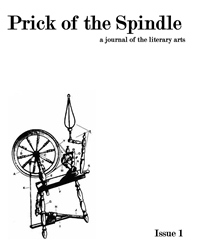 Edited by Cynthia Reeser, Prick of the Spindle Print Edition comes to readers biannually in October and April of every year and is available in paper copy and eBook (Kindle).
Edited by Cynthia Reeser, Prick of the Spindle Print Edition comes to readers biannually in October and April of every year and is available in paper copy and eBook (Kindle).
Already having established the well-known and respected online quarterly publication, Prick of the Spindle, Reeser comments: “I started the print edition in part to expand our audience and readership, as well as the scope of what we publish. As a nonprofit, we wish to initiate subscriptions and also to be able to pay our contributors, and the print edition helps us to do both.”
Prick of the Spindle readers can expect to find fiction, drama, nonfiction, poetry, interviews, and essays of a more formal nature, as well as artwork and experimental text/image pieces.
The inagurual print edition includes an interview with Sandy Longhorn, poetry by Jessica Cuello, Nandini Dhar, Claire Stephens (text/image), nonfiction by Juan Daniel Mill
Spread the word!
Prairie Schooner Contemporary Irish Writing Issue
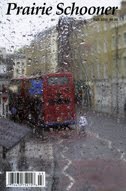 Prairie Schooner Winter 2011 is a special issue devoted to contemporary Irish writing. As Interim Senior Editor Stephen C. Behrendt writes: “Unlike many ‘special issues’ of journals, this one has not begun with a predetermined narrow list of contributors from whom we solicited the contributions that now appear here. Instead, we have happily welcomed the work of many writers who responded to our general invitation for submissions, and this present issue samples some of the most compelling and vibrant contributions from among this wealth of splendid material. It represents, then, a cross section of the Irish writing community today, in all its rich diversity. . . The poetry , fiction, and drama in this issue testify to the enduring themes not just of Irish culturebut indeed of the whole human enterprise.”
Prairie Schooner Winter 2011 is a special issue devoted to contemporary Irish writing. As Interim Senior Editor Stephen C. Behrendt writes: “Unlike many ‘special issues’ of journals, this one has not begun with a predetermined narrow list of contributors from whom we solicited the contributions that now appear here. Instead, we have happily welcomed the work of many writers who responded to our general invitation for submissions, and this present issue samples some of the most compelling and vibrant contributions from among this wealth of splendid material. It represents, then, a cross section of the Irish writing community today, in all its rich diversity. . . The poetry , fiction, and drama in this issue testify to the enduring themes not just of Irish culturebut indeed of the whole human enterprise.”
Spread the word!
NewPages Literary Magazine Reviews Posted
Check out the latest great post of NewPages Literary Magazine Reviews, including both new and established publications in print and online:
Alaska Quarterly Review
Bellevue Literary Review
Black Lantern Publishing
Booth
CaKe
The Carolina Quarterly
Faultline
The Helix
Magnolia
The Main Street Rag
New Orleans Review
Off the Coast
Palooka
Paul Revere’s Horse
Phantom Drift
Post Road
River Teeth
Silk Road
Straylight
Tin House
Spread the word!
You Had Me at “My Father Stood Loading His Gun”
I love it when I find a story I simply cannot turn away from reading, even when I think I should because I think I know where it’s going, and especially when I’m wrong and it takes me somewhere unexpected. Lucas Dean Fiser’s story in Pif Magazine had me at the title: “My Father Stood Loading His Gun,” and after this opening, I was spellbound:
“My father stood in my doorway holding his .45 caliber handgun. He leaned against the wood framework smoking a cigarette, loading the gun. Smoke circled his head like a halo, and I gently laid the book I was reading into the sheets. Every time he loaded a bullet you could hear the steel snap into the magazine. His mouth moved when he did this…”
Read the rest here. It’s not long to read, but be ready for it to stay with you for a while.
Spread the word!
Missouri Review Audio Contest Winners
Winners of the The Missouri Review Fourth Annual Audio Contest include:
Poetry – Greg Brownderville, “Sex and Pentecost”
Prose – Rachel Yoder, “I’m White and I’m Mennonite”
Self-Recorded Documentary – Ken Cormier, “Voices of the Dead”
Professionally Recorded Documentary – Anna Pinkert, “After the Flood”
All recordings, along with past audio entries, can be heard on The Missouri Review Audio Page.
Spread the word!
The Moth: Pitch Your True Story Online
The Moth: True Stories Told Live began in 1997 as a venue of storytelling in front of a live audience. The Moth Radio Hour, begun in 2009, is now on over 200 radio stations nationwide. There are a number of stories that can be accessed from the web, and The Moth is currently accepting stories to feature on its website. Storytellers are invited to record their one-minute pitch right on The Moth website, or if you have trouble with the online recording gizmo, there is a phone number to call and pitch your story via phone. All stories must be true – and no cliffhangers. What are your waiting for?
Spread the word!
Able Muse Write Prize Winners 2011
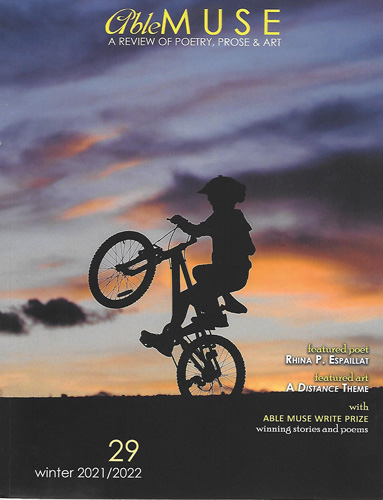 The Winter 2011 issue of Able Muse includes winners and finalists for its 2011 Write Prize contest:
The Winter 2011 issue of Able Muse includes winners and finalists for its 2011 Write Prize contest:
Write Prize for Fiction – Final Judge: Alan Cheuse
Winner: Douglas Campbell – “Sunflowers, Rivers”
Write Prize for Poetry – Final Judge: Rachel Hadas
Winner: Jean L. Kreiling – “Waiting for a Helicopter”
Second: Susan McLean – “Teaching to the Test”
Finalists: John Beaton – “Your Voice”; Catherine Chandler – “This Dusky Arc”; T.S. Kerrigan – “Missing the Sunset at Sounion”; Joshua Lavender – “The Guest”; Gabriel Spera – “Bread and Fish”; Richard Wakefield – “Crossing”
An additional list of poetry honorable mentions can be found on the publication website.
Spread the word!
Black Lantern Publishing – November 2011
Aaron Milstead’s short story “The Pickled Man” was such an easy and captivating read that I suggested to my twelve-year-old son that he read it as well. As I predicted, he devoured the story of Wilber Will’s World of Wonders that features a mysterious oddity floating around in a pickle jar. That night, at around two a.m., I awoke to a shadowy figure standing at the foot of my bed. I knew immediately that figure was my son and that he’d just had a nightmare featuring, not surprisingly, the pickled man. After putting him back to bed, I thought about the power of Milstead’s story. It had left an unsettling impression on my son—one that lies just below the cerebral surface—long after he’d finished reading it. It is the titillating payoff that you hope for when you read something particularly spooky. This is exactly what Black Lantern Publishing’s fifth issue offers its readers with its collection of short stories, poetry, flash fiction, and artwork, all within a macabre theme. Despite my recommendation to my son, this is not a collection intended for children. BLP offers an assortment of haunting contemplations that deal with the subject of death and ushers readers to a darker side of literature. Continue reading “Black Lantern Publishing – November 2011”
Spread the word!
Booth – December 2011
Run by the MFA program at Butler University, Booth publishes something every week on their website and has a print publication each spring. I have never seen the print edition, but found the online material quite intriguing. I was especially impressed by their selections of poetry. Continue reading “Booth – December 2011”
Spread the word!
Palooka – 2011
The subtitle of Palooka seems to indicate that editors Nicholas Maistros and Jonathan Starke have something of an outsider’s mindset. This “journal of underdog excellence” contains work that, according to Maistros, responds to the “storms” we experience in “different yet collectively elemental ways.” From the journal’s colorful and playfully disturbing cover art to its entertaining contributors’ notes, Palooka turns the difficult trick of making itself accessible to a wide range of audiences without talking down to them. Continue reading “Palooka – 2011”
Spread the word!
Silk Road – Summer/Fall 2011
As most people know, the Silk Road was a many-thousands-of-miles-long trade route linking Asia with the rest of the world in ancient times, a network of land and sea avenues over which civilizations traveled and cultures interfused. The goal of Pacific University’s literary journal is to “give readers a vivid point of exchange or interaction that could occur only in a specific time and space . . . ‘place’ is the touchstone the magazine uses for the pieces we publish.” In this issue, there are eight stories, six pieces of creative nonfiction, work from sixteen poets, and a provocative interview that “take readers somewhere crucial, defining and relevant.” The issue as a whole is a journey worth taking. Continue reading “Silk Road – Summer/Fall 2011”
Spread the word!
Straylight – Spring 2011
Straylight is pure, enjoyable entertainment. It is eclectic enough to satisfy any reader’s mood. This collection of fiction, poetry, an interview, and visual art is pretty darned amazing. At first glance, the selections may seem disjointed, especially for literary magazine readers who have become accustomed to themed collections, or high literary selections. Straylight is just plain fun, and the works that make up this volume are like a colorfully arrayed salad bar where you, Gentle Reader, get to pick the most enticing morsels. Continue reading “Straylight – Spring 2011”
Spread the word!
Tin House – Fall 2011
A little of this, a little of that, effectively used white space, not over-crowded by images or advertisements, Tin House provides for a generally pleasant read. This issue of Tin House is subtitled “The Ecstatic.” This, along with the sheer caliber of her writing, explains the inclusion of Kelly Link’s “The Summer People” in this issue. Her characters are most definitely of ecstatic stock. Continue reading “Tin House – Fall 2011”
Spread the word!
Paul Revere’s Horse – 2011
The Editor’s Note for this issue suggests, “Texts, like lives, are precarious projects.” And Iranian ex-patriot Moniru Ravanipur, whose writings are banned in her homeland, interviewed by Miranda Mellis, reminds us that, “Stories are a testament to their time, especially in countries like mine.” Ravanipur knows too well the vital connection between writing and living. She describes how, “The short story for me is like a mirror that reflects different worlds—worlds that already exist, or worlds that could be or should be.” No matter what else, writing allows for confronting and challenging any established order. Continue reading “Paul Revere’s Horse – 2011”
Spread the word!
Alaska Quarterly Review – Fall/Winter 2011
I believe (but I might be convinced otherwise) that my favorite piece in this issue of the Alaska Quarterly Review is Charles Wyatt’s “An Accidental Dictionary”—a listing of strange, delicious, and mostly obsolete words taken from three late-twentieth-century specialty word-books. “Bomolluck: . . . not a thing in the night, but what you fear in the night. It can sit on your chest.” “Kist: a basket for the baby Moses or Noah’s ark or Queequeg’s coffin, or the cup of the sea, or the stinging stars pursuing . . . and the heavens see only fog, neither rising nor falling. Tuned. All attention. Will.” “Gardyloo: . . . there is no truth in truth and I have lost my cats.” To word lovers like me, these changeling glomerations of sound are glorious, and Wyatt’s explanations are grand spills of imagery. I can’t resist the temptation to use them to talk about the rest of the issue. Continue reading “Alaska Quarterly Review – Fall/Winter 2011”
Spread the word!
Bellevue Literary Review – Fall 2011
Last week my creative nonfiction writing class workshopped a piece about one student’s experience with ADD in elementary school. He described zigzag thoughts, hypersensitive ears, rising frustration, and a positively entertaining rage, in a perfectly modulated eight-year-old voice; he then took us through the process of diagnosis, disastrous prescription of inappropriate meds, and ultimately courageous development of a customized program that enabled him to manage the disorder satisfactorily. His understated irony, his consistent voice, and the beautifully appropriate imagery made the piece one of the most successful our class has seen this semester. Continue reading “Bellevue Literary Review – Fall 2011”
Spread the word!
Cake – Spring 2011
This fifth publication of Cake contains exceptional writing, including poetry, fiction, reviews, drama, and interviews. Breauna Roach’s poem “Scrambled” left me a bit unsettled, but there is no doubt as to her genius. Roach begins by revealing her discovery that cupcakes are never found in a garbage disposal, they are sweet desserts that would be shameful to waste; however, eggs are a whole different story: Continue reading “Cake – Spring 2011”
Spread the word!
The Carolina Quarterly – Winter/Spring 2011
“Will you still need me, will you still feed me, when I’m sixty-four?” As the venerable Carolina Quarterly enters its 64th year of publication in 2012, the answer from discerning readers, and good writers, must be yes. Poetry, fiction, essays, reviews, and graphic art accepted by the CQ’s editors provide a select tour through recent works of both polished and emerging writers and artists. Thematically, this issue features that which is certain—death and Texas. Continue reading “The Carolina Quarterly – Winter/Spring 2011”
Spread the word!
Faultline – Spring 2011
Faultline is the journal of the English department at the University of California-Irvine. The journal has a quiet, slightly offbeat feel to it. Much of the fiction is the kind that could be about people you know—but, then, there’s just something different, something slightly magical and slightly weird about it. Continue reading “Faultline – Spring 2011”
Spread the word!
The Helix – Spring 2011
The Helix is a biannual literary magazine run by students of Central Connecticut State University and is comprised of drawings, paintings, photographs, prose and poetry. Like helical strands of DNA, the art and literature printed in The Helix represents vast permutations of human experience and possibility. Continue reading “The Helix – Spring 2011”
Spread the word!
Magnolia – 2011
Magnolia: A Journal of Women’s Literature broke into the literary world just this year. The first guest editor, Gayle Brandeis, is an author of both young adult and adult fiction and has also been honored for her work as an activist. A little blurb on the back of the collection promises that Magnolia is “a diverse collection that will open your eyes, challenge your thinking, and break your heart.” And Magnolia certainly delivers. Continue reading “Magnolia – 2011”
Spread the word!
Main Street Rag – Fall 2011
I really like the way Main Street Rag fits in my hand; it’s the perfect size for a literary magazine. It’s also cool that MSR publishes letters from readers. In my experience, that’s a rarity for a literary mag, but one that I think adds to the experience of reading a magazine. It’s always fun to see what other readers have to say. Publisher/Editor M. Scott Douglass clearly puts a considerable amount of work into Main Street Rag, and marks each issue with his own “Front Seat” and “Back Seat” columns that bookend the contents. Not shy about veering into political territory, Douglass launches this particular issue’s “Back Seat” into a commentary on American economics and class struggles, offering up his own solutions on tax issues (two options to choose from!). This sort of diatribe within a literary magazine may seem out of place to some readers, but I found it refreshing. It helps to project the image that MSR is quite comfortable in its own skin. Continue reading “Main Street Rag – Fall 2011”
Spread the word!
New Orleans Review – 2011
I’ve always viewed the New Orleans Review as one of the silverbacks of the modern literary journal scene. Despite the obvious setbacks in dealing with Hurricane Katrina’s aftermath, it still surges ahead as one of the leading reviews with a promise of great work by great writers—those well-known, and those not. Some have said it is better than ever. This current issue does not disappoint, especially with Jacob M. Appel’s story “Prisoners of the Multiverse,” winner of the 2011 Walker Percy Fiction Contest. Not wanting to ruin the story for future readers, I will quote Nancy Lemann, judge for this year’s prize, in her introduction to the piece: Appel’s story “preserves the mystery” of a thing of beauty and delivers “what I seek in literature: inspiration, hope, and possibility.” Continue reading “New Orleans Review – 2011”
Spread the word!
Off the Coast – Fall 2011
Off the Coast, based out of Robbinston, Maine, publishes poems, artwork, and reviews. It seems to me that this particular issue has a strong focus on nature and animals interacting within their natural surroundings. The title of each issue is chosen from a line or phrase from one of the issue’s selected poems. The Fall 2011 issue is entitled Everything Here. The editors make a very honest effort to live up to the promise of such a title. Continue reading “Off the Coast – Fall 2011”
Spread the word!
Phantom Drift – Fall 2011
It’s possible that the mark of an evolved soul is the ability to pass at will into whatever state of consciousness is useful or appropriate at any given time. Over twenty distinct such states have been observed, with names like reverie, lethargy, trance, and rapture. The question of when such states are useful or appropriate is the subject of story and song from time immemorial. That they are essential to our lives if we are ever to be whole is the conviction behind a compelling new journal whose title hints at this ability I’ve described: Phantom Drift. Continue reading “Phantom Drift – Fall 2011”
Spread the word!
Post Road – 2011
Post Road offered me surprises that I don’t believe I have actually seen in other magazines. For instance, during my first official flip through, my thumb stopped on a page where Micah Nathan reviews The Stories of John Cheever, claiming that, although not a “titan like Hemingway or Faulkner . . . there’s room in the pantheon for gods of all types. We reserve a temple for him.” I can’t recall how many reviews (celebrations?) of Cheever I have read in modern literary magazines—because I don’t believe that I ever have. And then on the page opposite began Asad Raza’s review of the 1983 Lizzie Borden movie Born in Flames, a movie that, according to the author: “makes most New York movies seem like sentimental fawning.” These two pieces represent the eclectic, brilliant choices the editors have made in putting the magazine together, which I think is its greatest strength. It caters to many different tastes, and, according to the magazine’s website, each submission is read by three different people before accepting or rejecting it—thus ensuring a strong collection with each biannual issue. Continue reading “Post Road – 2011”
Spread the word!
River Teeth – Fall 2011
One of the merits of nonfiction narratives is that they indulge human curiosity about others’ lives. The fall issue of River Teeth, a magazine dedicated solely to narrative nonfiction, includes eleven true stories, all of which quickly and convincingly pull you into the authors’ lives for brief, powerful episodes. While some stories uniquely explore common phenomena like homesickness, others offer coveted glimpses into rare experiences. The four most memorable stories in the collection are those whose subject matter and narrative voice are equally captivating. Continue reading “River Teeth – Fall 2011”
Spread the word!
2011 Iowa Review Contest Winners
 Winners and runners-up of the 2011 Iowa Review Awards Contest are featured in the Winter 2011 publication:
Winners and runners-up of the 2011 Iowa Review Awards Contest are featured in the Winter 2011 publication:
Nonfiction Winner: Helen Phillips, “Life Care Center”
Poetry Winner: Emily Van Kley, 10 poems
Fiction Winner: John Van Kirk, “Landscape with Boys”
Runners-up
Maria Rapoport (nonfiction); Kimberly Burwick (poetry); Suzanne Scanlon (fiction)
Spread the word!
Clapboard House 2011 Short Story Contest Winners
 Judged by writer Gerald Duff the winner of the 2011 Clapboard House Short Story Contest is “The Bet” by Steven D. Stark. His story, along with those of the nine runner-ups, are available in the newest online issue of Clapboard House. Stark’s winning story will also be included in the planned print edition of THE BEST OF CLAPBOARD HOUSE.
Judged by writer Gerald Duff the winner of the 2011 Clapboard House Short Story Contest is “The Bet” by Steven D. Stark. His story, along with those of the nine runner-ups, are available in the newest online issue of Clapboard House. Stark’s winning story will also be included in the planned print edition of THE BEST OF CLAPBOARD HOUSE.
Spread the word!
New Lit on the Block :: Enizagam
 What do celeb’ author Lemony Snicket (AKA Daniel Handler), luminary poet Nikki Giovanni, Pulitzer Prize winner Robert Olen Butler, Sister Spit founder Michelle Tea, MacArthur Genius Award winner Yiyun Li, literary legend Walter Mosley, Pushcart nominee Soma Mei Sheng Frazier, and thirty young writers at an urban public high school have in common?
What do celeb’ author Lemony Snicket (AKA Daniel Handler), luminary poet Nikki Giovanni, Pulitzer Prize winner Robert Olen Butler, Sister Spit founder Michelle Tea, MacArthur Genius Award winner Yiyun Li, literary legend Walter Mosley, Pushcart nominee Soma Mei Sheng Frazier, and thirty young writers at an urban public high school have in common?
Rewind back exactly one year, to January 2011: in a renovated Art Deco theater complex in Downtown Oakland, CA, a seminar-sized group of young writers put their noses to the grindstone. That day marked the first day of the Enizagam course at Oakland School for the Arts (OSA), a public charter school that admits students grade-blind on the basis of artistic auditions.
OSA was founded in 2002 by CA Governor Jerry Brown—then Mayor of Oakland. It serves over 600 talented middle and high school students. Soma Mei Sheng Frazier, Chair of Literary Arts, explains: “These kids competed for acceptance into the program. They want to be here, and I want to give them a private-school-caliber experience, tuition free. To do that, I completely overhauled our literary journal, which was once a typical publication featuring student work.” It hasn’t been easy. While the school has stacked up accolades for its arts-based methodology, and for closing the achievement gap between student subgroups, its arts programs receive zero public funding.
The students, and Frazier, run the journal as a labor of love. Frazier describes the young staff as “sophisticated readers, poised to apply razor-sharp focus.” The students gain the nuts-and-bolts experience of running a serious literary journal, and Enizagam’s readers gain access to stunning new writing selected by fresh editorial eyes.
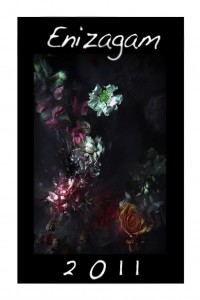 Enizagam’s goal? To become the first secondary-student-run literary publication with serious national acclaim. It may already have achieved that. While run by urban high school kids, it is written by and for adults. Last year, it received submissions from award-winning authors working across—and beyond—the U.S. Contributors included Jendi Reiter, Laura Shearer, Nick Kriefall and Rae Gouirand, who has just come out with a new book of poetry: Open Winter, winner of the 2011 Bellday Poetry Prize. Bookstores have begun shelving Enizagam, and the 2012 issue’s literary contest judges will be Lemony Snicket and Nikki Giovanni. Robert Olen Butler and Michelle Tea judged last year’s competition.
Enizagam’s goal? To become the first secondary-student-run literary publication with serious national acclaim. It may already have achieved that. While run by urban high school kids, it is written by and for adults. Last year, it received submissions from award-winning authors working across—and beyond—the U.S. Contributors included Jendi Reiter, Laura Shearer, Nick Kriefall and Rae Gouirand, who has just come out with a new book of poetry: Open Winter, winner of the 2011 Bellday Poetry Prize. Bookstores have begun shelving Enizagam, and the 2012 issue’s literary contest judges will be Lemony Snicket and Nikki Giovanni. Robert Olen Butler and Michelle Tea judged last year’s competition.
Yiyun Li and Walter Mosley will soon be interviewed by the journal’s student staff for the 2012 issue. Kerby Lynch, Student Co-Editor in Chief, interviewed Farm City phenom’ Novella Carpenter for the 2011 issue. Says Lynch: “Among other questions about her urban farm, I asked Novella how often the goats’ breath smelled delicious. Her answer? ‘Always.’” The student staff is “juiced” to see the new next issue on bookstore shelves in 2012.
Writers: “We can’t wait to dig into this year’s submissions!” Check out the 2012 Enizagam Literary Awards in Poetry and Fiction at: http://enizagam.org
[Press release provided by the editors of Enizagam; Cover Art: Zooey Yi]
Spread the word!
MAR Fiction & Poetry Award Winners
The newest issue of Mid-American Review (v31 n2) includes the 2010-11 Sherwood Anderson Fiction Award: Lydia Fitzpatrick (“Flood Lines”) and winner of the 201-11 James Wright Poetry Award: Katie Umans (“Forecast”).
Spread the word!
Spoon River Poetry Review Contest Winners
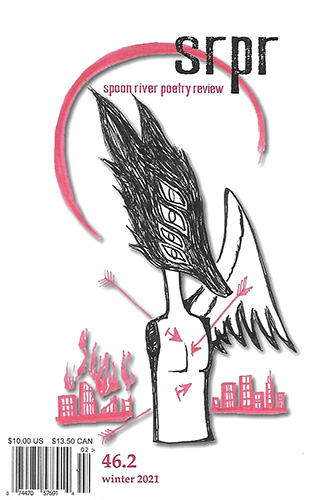 The Summer/Fall 2011 issue of Spoon River Poetry Review features the 2011 Editors’ Prize Winners selected by final judge Cecil S. Giscombe:
The Summer/Fall 2011 issue of Spoon River Poetry Review features the 2011 Editors’ Prize Winners selected by final judge Cecil S. Giscombe:
First Place ($1,000): Jennie Ray
First Runner Up ($100): Craig Blais
Second Runner Up ($100): Ben Purkert
Honorable Mentions: Miles Waggener, Molly Tustison, Neal Shipley, Suzume, Laura Sherwood Rudish.
One winning poem will be awarded $1000 and two runners-up awarded $100 each in this annual contest. Winning poem, runners-up, and honorable mentions are published in the fall issue.
Spread the word!
New Lit on the Block :: Kudzu Review
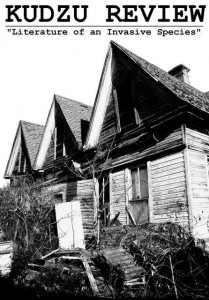 Kudzu Review is a biannual online ecojournal. Editor-in-Chief M.P. Jones IV writes that the title is from his grandfather’s, Madison Jones, house “which we lovingly called ‘Kudzu’ for the plant which proliferated along the property line. He was a farmer, writer, literary critic, and professor in Auburn, Alabama.”
Kudzu Review is a biannual online ecojournal. Editor-in-Chief M.P. Jones IV writes that the title is from his grandfather’s, Madison Jones, house “which we lovingly called ‘Kudzu’ for the plant which proliferated along the property line. He was a farmer, writer, literary critic, and professor in Auburn, Alabama.”
The biannual publication is available in PDF and on Issuu, and looks to publish “savvy, sharp, well polished literature that captures life in a post-natural world” and works that “cast new light on rapid species extinction, climate change, food production, technology, sustainability and community.”
The first issue of Kudzu Review features fiction, poetry, and artwork by
Aaron Poller, André Babyn, Ann Cavlovic, Anthony Rintala, Ashleigh Rajala, Becky Garrison, Cassie Premo Steele, Dominic James, Donal Mahoney, Donna Emerson, Drew Jennings, Dwain Wilder, Ed Zahniser, Jack Foster, Jeanpaul Ferro, Joan Colby, John Bohannon, Joseph Rhea, Karla Linn Merrifield, Kenneth Pobo, Lakshmi Eassey, Laurie A Skelton, Maggie Koger, Mercedes Lawry, Sue Blaustein, Susi Lovell, Thomas Fussey, Trent Laubscher, and Tiffany Morris.
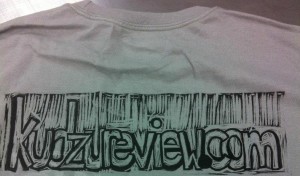 Kudzu Review is also offering a “fundraiser” for their publication: woodcut carving t-shirts, each individually hand pressed with a unique front design and back logo. T-shirt buyers have their names listed on a page “forever” in recognition of their support.
Kudzu Review is also offering a “fundraiser” for their publication: woodcut carving t-shirts, each individually hand pressed with a unique front design and back logo. T-shirt buyers have their names listed on a page “forever” in recognition of their support.
Kudzu Review is open on a rolling basis for e-mail submissions of short stories, flash fiction and poetry, and Submishmash submissions of art and photography.
Kudzu Review is staffed by Senior Editors: M.P. Jones IV, Editor-in-Chief; Arthur Wilke, Field Editor; Robin Ward, Web-Design Editor; and Associate Editors: Powell Burke, Fiction & Revisions Editor; Jane Alford, Nonfiction & Revisions Editor; Rivers Langley, 20-Year-Man Assistant Editor; and Ashley Sams, Visual Art Editor.
Spread the word!
The Night Before Christmas
Russian writer Nikolai Gogol is famous for his serious satiric novel The Overcoat, but The Night Before Christmas, originally published in a 1926 short story collection, was Gogol’s first work at age 27—an early contribution to Russian literature. Recognized then for its fine writing and humor, now it can also be appreciated as a charming picture of Ukrainian folklore. Instead of Scrooge or the Grinch, the devil and a witch make mischief on a night full of mystical forces, the night before Christmas. Continue reading “The Night Before Christmas”
Spread the word!
Betty Superman
Ten stories make up Tiff Holland’s collection, Betty Superman. The stories themselves are short; altogether they fill only thirty-four pages, stapled into a lovely little edition from Rose Metal Press. But the size of Holland’s collection is deceiving. These stories cover the span of a life as only linked shorts can. They invite the reader to fill in the spaces between the wacky and outrageous scenarios our narrator and her mother, Betty, find themselves in. Continue reading “Betty Superman”
